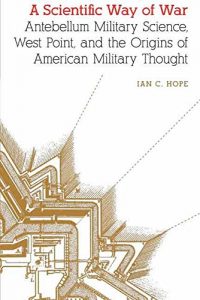While faith in the Enlightenment was waning elsewhere by 1850, at the United States Military Academy at West Point and in the minds of academy graduates serving throughout the country Enlightenment thinking persisted, asserting that war was governable by a grand theory accessible through the study of military science. Officers of the regular army and instructors at the military academy and their political superiors all believed strongly in the possibility of acquiring a perfect knowledge of war through the proper curriculum.
A Scientific Way of War analyzes how the doctrine of military science evolved from teaching specific Napoleonic applications to embracing subjects that were useful for war in North America. Drawing from a wide array of materials, Ian C. Hope refutes earlier charges of a lack of professionalization in the antebellum American army and an overreliance on the teachings of Swiss military theorist Antoine de Jomini. Instead, Hope shows that inculcation in West Point’s American military curriculum eventually came to provide the army with an officer corps that shared a common doctrine and common skill in military problem solving. The proliferation of military science ensured that on the eve of the Civil War there existed a distinctly American, and scientific, way of war.






